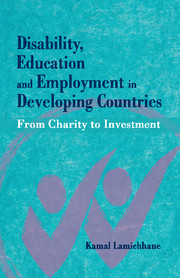Book contents
- Frontmatter
- Contents
- List of Tables and Figures
- Preface
- Acknowledgements
- 1 Fundamentals of Disability Studies
- 2 Disability and the Global Employment Situation
- 3 Disability and the Role of Education in Jobs: Case Studies from Nepal and the Philippines
- 4 Disability and Jobs in a Post-Conflict Country: Cambodia
- 5 Gender and Jobs: A Comparison between People with and without Disabilities in Bangladesh
- 6 Disability and Human Capital Investment
- 7 Disability, Poverty and Inequality: A Case Study in Nepal
- 8 Disability and Job Satisfaction Differentials
- 9 Disability and Determinants of Education: A Case from India
- 10 Disability and Barriers to Education
- 11 The Way Forward: Investment in Disability
- Index
- About the Author
6 - Disability and Human Capital Investment
Published online by Cambridge University Press: 05 February 2015
- Frontmatter
- Contents
- List of Tables and Figures
- Preface
- Acknowledgements
- 1 Fundamentals of Disability Studies
- 2 Disability and the Global Employment Situation
- 3 Disability and the Role of Education in Jobs: Case Studies from Nepal and the Philippines
- 4 Disability and Jobs in a Post-Conflict Country: Cambodia
- 5 Gender and Jobs: A Comparison between People with and without Disabilities in Bangladesh
- 6 Disability and Human Capital Investment
- 7 Disability, Poverty and Inequality: A Case Study in Nepal
- 8 Disability and Job Satisfaction Differentials
- 9 Disability and Determinants of Education: A Case from India
- 10 Disability and Barriers to Education
- 11 The Way Forward: Investment in Disability
- Index
- About the Author
Summary
The concept of returns to education
Academic discussion on returns to education gained prominence in the 1960s with Schultz's ground-breaking work on the need to invest in human capital, which would later evolve further into the economic value of education (since investment in human capital constitutes learning, which is formally no different from education, on-the-job training or other recognized investments [Schultz 1963; Becker 1964]).
The concept of human beings as resources to be tapped into was controversial to some, as it seemed to reduce a person to being a mere good or property that could be utilized (maximally). However, drawing on the works of early economists such as Adam Smith, Schultz argued that it is only when people invest in themselves that they can expand their opportunities to enhance their own well-being (Schultz 1963). The study by Card (1999) proceeded to demonstrate that better-educated individuals earn higher wages, experience less unemployment and work in better occupations than their less-educated counterparts do. Conversely, with the onset of mass schooling in the post-industrial age, one major thread of the discussion on investment in human capital was the economic growth that such an investment would bring about, laying the framework for studies on returns to education.
Becker (1964) posed that the most important single determinant of investment in human capital would be its rate of return, or the wages received through labour market participation. Psacharopoulos and Patrinos (2004) also propose that returns to education are a useful indicator of the productivity of education and the incentive for individuals to invest in their own human capital. In another study, Card and Krueger (1992) found that returns to education could also be an indicator of the quality of education. Using US census earnings data in the 1980s, they found that higher quality schools had a higher return on additional years of schooling; rates of return were also higher for individuals from states with better-educated teachers and with a higher proportion of female teachers. Developing countries tend to compromise on the quality of education, in the interest of expanding the masses' access to education.
- Type
- Chapter
- Information
- Disability, Education and Employment in Developing CountriesFrom Charity to Investment, pp. 112 - 133Publisher: Cambridge University PressPrint publication year: 2015



